
FRAGMENTA ENTOMOLOGICA
Scope & Guideline
Illuminating the ecological roles of insects.
Introduction
Aims and Scopes
- Taxonomic Descriptions and Revisions:
The journal frequently publishes detailed taxonomic studies, including descriptions of new species, revisions of existing taxa, and updates on classification systems, reflecting its commitment to advancing entomological knowledge. - Biodiversity Assessments:
Many articles focus on documenting species distributions and biodiversity assessments in specific geographic areas, thereby contributing valuable data for conservation efforts and ecological studies. - Ecological and Environmental Studies:
Research published often explores ecological interactions, species' adaptations to environments, and the impact of environmental changes, particularly in relation to climate change and habitat alteration. - Regional Faunal Studies:
The journal places a strong emphasis on regional studies, highlighting the entomological diversity of specific areas, which aids in understanding global biodiversity patterns. - Methodological Innovations:
FRAGMENTA ENTOMOLOGICA encourages the use of innovative methodologies in entomological research, including molecular techniques for species identification and ecological assessments.
Trending and Emerging
- Climate Change Impacts:
A noticeable increase in studies examining the effects of climate change on insect distributions and behaviors suggests a growing recognition of the urgency to understand how environmental changes impact biodiversity. - Conservation Biology:
Research focusing on conservation strategies and biodiversity preservation has gained momentum, highlighting the importance of protecting insect species and their habitats amidst global biodiversity crises. - Molecular Techniques in Taxonomy:
The integration of molecular techniques for species identification and phylogenetic studies is emerging as a strong trend, providing deeper insights into the evolutionary relationships among species. - Regional and Local Fauna Cataloging:
There is a rising trend in cataloging and documenting local faunas, particularly in under-studied regions, which aids in global biodiversity assessments and conservation planning. - Interactions Between Species and Ecosystems:
Studies exploring the interactions between different insect species, as well as their roles within ecosystems, are becoming increasingly prominent, reflecting a holistic approach to understanding ecological dynamics.
Declining or Waning
- General Insect Behavior Studies:
While there have been significant contributions to the understanding of specific insect behaviors, broader studies on general insect behavior have become less frequent, possibly overshadowed by more specialized ecological and taxonomic research. - Insect Physiology and Morphology:
Research specifically targeting physiological and morphological aspects of insects appears to have decreased, suggesting a shift towards ecological and biodiversity-focused studies instead. - Urban Entomology:
Although urban ecology remains important, studies specifically addressing urban entomology and the impacts of urbanization on insect populations have become less prevalent in recent issues. - Agricultural Entomology:
Research focusing on pests in agricultural contexts, while still relevant, has seen a reduction in publication frequency, perhaps reflecting a broader focus on biodiversity and conservation over pest management.
Similar Journals

ACTA ENTOMOLOGICA MUSEI NATIONALIS PRAGAE
Connecting Scholars in the Study of EntomologyACTA ENTOMOLOGICA MUSEI NATIONALIS PRAGAE, published by the esteemed NARODNI MUZEUM - PRIRODOVECKE MUZEUM in the Czech Republic, is an influential journal in the fields of Ecology, Evolution, Behavior and Systematics, as well as Insect Science. With an ISSN of 0374-1036 and an E-ISSN of 1804-6487, this journal has established itself as a vital resource for researchers, professionals, and students interested in the intricate world of entomology. Spanning publications from 2005 to 2024, it is recognized for its contributions to the understanding of insect biology, offering insights on ecological interactions and evolutionary relationships. Although it operates as a subscription-based platform, the journal maintains a respectable presence in scholarly circles, positioned in the Q2 quartile for both relevant categories in 2023. ACTA ENTOMOLOGICA serves not only as a repository of significant empirical findings but also as a discourse platform for emerging entomological concepts, making it an essential read for those involved in the biological sciences.
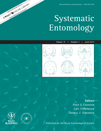
SYSTEMATIC ENTOMOLOGY
Connecting Science and Discovery in EntomologySYSTEMATIC ENTOMOLOGY is a premier journal published by Wiley, specializing in the field of entomology with a particular focus on insect systematics, ecology, evolution, and behavior. With its strong academic reputation, this journal has achieved a remarkable Q1 ranking in both Ecology, Evolution, Behavior and Systematics and Insect Science categories, affirming its influence and importance in advancing research in these critical areas. SYSTEMATIC ENTOMOLOGY has a broad scope, making it a valuable source for original research, reviews, and methodological advancements that contribute to the understanding of insect biodiversity and systematics. Operating from the United Kingdom, the journal is dedicated to fostering knowledge and innovation within the scientific community, ensuring that high-quality research is accessible to researchers, professionals, and students alike. The journal's consistent publication since 1976 and its continued relevance up to 2024 exemplify its commitment to the field and its readers.
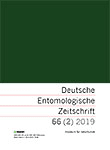
DEUTSCHE ENTOMOLOGISCHE ZEITSCHRIFT
Advancing Knowledge in EntomologyDEUTSCHE ENTOMOLOGISCHE ZEITSCHRIFT is a premier open access journal dedicated to the vibrant field of entomology, proudly published by Pensoft Publishers. With a rich publication history dating back to 1954, this journal serves as a vital platform for disseminating high-quality research in Animal Science, Zoology, and Insect Science, currently holding a commendable Q2 quartile ranking in these disciplines. The journal embraces the accessibility of science, having transitioned to an open-access model in 2014, ensuring that all readers can engage with cutting-edge findings and innovative studies without barriers. Researchers, professionals, and students alike will find the journal's breadth of topics—ranging from basic ecological studies to applied entomological research—essential for keeping abreast of developments that impact biodiversity and ecosystem functioning globally. With its commitment to supporting the entomological community, DEUTSCHE ENTOMOLOGISCHE ZEITSCHRIFT remains a cornerstone for anyone interested in the intricate world of insects.
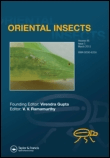
ORIENTAL INSECTS
Bridging Science and Conservation in Insect StudiesORIENTAL INSECTS is a distinguished journal dedicated to advancing the field of Insect Science, published by the reputable Taylor & Francis Ltd. With its long-standing history since 1967, this journal provides a platform for innovative research focused specifically on the diverse insect fauna of the Oriental region, encompassing topics such as taxonomy, ecology, physiology, and behavior. The journal is indexed with an ISSN of 0030-5316 and an E-ISSN of 2157-8745, making it easily accessible to a global audience. Although it currently does not operate under an Open Access model, its rigorous peer-review process ensures the dissemination of high-quality research. As a Q4 journal in the Insect Science category for 2023 and ranked 103 out of 181 in Scopus, ORIENTAL INSECTS remains a vital resource for researchers, professionals, and students seeking to enhance their understanding of insect biodiversity and conservation. Located in the United Kingdom, it is committed to promoting the latest scientific findings and fostering collaboration among entomologists worldwide, contributing significantly to the academic community.

CANADIAN ENTOMOLOGIST
Cultivating a Deeper Understanding of Insect InteractionsCanadian Entomologist, published by Cambridge University Press, is a prominent journal dedicated to the field of entomology, covering key areas such as insect science, ecology, and evolutionary biology. With its origins dating back to 1868, this esteemed journal has continuously contributed to the understanding of insect behavior, systematics, and physiology, engaging researchers and professionals alike. Although currently not an Open Access journal, it offers valuable insights through its rigorously peer-reviewed articles, reflecting its commitment to scientific excellence. The journal has garnered a respectable Q3 ranking in various categories, including Ecology, Evolution, Behavior, and Systematics, making it a critical resource for scholars and students who seek to explore the complex interactions within insect populations and their environments. Researchers can trust Canadian Entomologist to provide relevant and impactful research that shapes contemporary understanding in the realm of entomological studies, fostering the growth of this vital scientific discipline.

INSECT SYSTEMATICS & EVOLUTION
Advancing the Frontiers of Insect ScienceINSECT SYSTEMATICS & EVOLUTION is a prestigious journal published by BRILL, which has been a vital source of scholarly information since its inception. Specializing in the fields of ecology, evolution, behavior, and systematics within the realm of insect science, this journal garners significant attention with its 2023 ranking in the second quartile across multiple categories, highlighting its relevance and impact in the field. With a focus on advancing knowledge through innovative research and reviews, it serves as an essential platform for researchers, professionals, and students alike, promoting an understanding of insect biodiversity and systematics. The journal’s accessibility options, including its Open Access policy, combined with a broad international scope, ensure that critical findings reach a diverse audience, fostering collaboration and discourse within the scientific community. Situated in the Netherlands, INSECT SYSTEMATICS & EVOLUTION maintains its commitment to excellence and strives to contribute actively to the ongoing dialogue in insect science, making it a must-read for anyone interested in the intricate world of insects.

Insects
Fostering Collaboration in Entomological DiscoveriesInsects is a prominent open-access journal published by MDPI, dedicated to advancing research in the vibrant field of insect science. Since its inception in 2011, this journal has become a vital resource for academics and professionals alike, also ranked in the prestigious Q1 category within the Insect Science field by Scopus, achieving a remarkable rank of 26 out of 181 journals. With an ongoing convergence period from 2010 to 2024, Insects provides comprehensive coverage of various aspects of entomology, including but not limited to ecology, behavior, physiology, and applied entomology. Based in Switzerland, the journal promotes an open-access model, ensuring that vital research is readily available to researchers, practitioners, and students globally. This journal not only facilitates the dissemination of groundbreaking entomological research but also fosters collaboration and interdisciplinary dialogue in the field.

EUROPEAN JOURNAL OF ENTOMOLOGY
Showcasing European excellence in insect science.The European Journal of Entomology, published by the Czech Academy of Sciences, Institute of Entomology, is a pivotal journal in the field of Insect Science. With a solid impact factor and recognized ranking—placed in the Q2 quartile in 2023, and ranked #72 out of 181—this journal offers a platform for researchers and professionals alike to share insightful studies and advancements in entomological research. Since its inception in 1993, the journal has continuously evolved to cover a wide spectrum of entomological disciplines, establishing itself as an essential resource for academia and industry. Although it operates on a subscription basis, the journal ensures accessibility for a broad audience of scholars, students, and enthusiasts eager to stay at the forefront of entomological science. Located in Ceske Budejovice, Czech Republic, this journal not only highlights European contributions but also embraces global perspectives, making it an indispensable reference point in the ongoing exploration of insect biology and ecology.
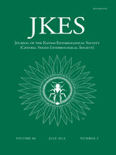
JOURNAL OF THE KANSAS ENTOMOLOGICAL SOCIETY
Advancing Knowledge in Entomology and EcologyJOURNAL OF THE KANSAS ENTOMOLOGICAL SOCIETY, published by the Kansas Entomological Society, serves as a vital platform dedicated to the field of entomology and insect science. With an ISSN of 0022-8567 and an E-ISSN of 1937-2353, this journal has established itself since its inception in 1994, continuing to contribute valuable research up to 2024. Despite its current Q4 categorization in the 2023 Insect Science rankings, it ranks 106 out of 181 in Scopus, representing a significant opportunity for researchers to disseminate their findings in a supportive and engaged community. Although it is not an open-access journal, its commitment to rigorous peer review and relevance in agricultural and biological sciences makes it an essential resource for professionals, scholars, and students alike. The journal's focus on local and regional entomological issues often addresses broader ecological impacts, showcasing the importance of insects in environmental health and agriculture. We invite you to explore the rich tapestry of findings and discussions within this esteemed publication.
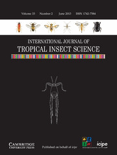
INTERNATIONAL JOURNAL OF TROPICAL INSECT SCIENCE
Uncovering the Secrets of Tropical Insect LifeINTERNATIONAL JOURNAL OF TROPICAL INSECT SCIENCE, published by Springer International Publishing AG, is a leading interdisciplinary journal dedicated to advancing knowledge in the fields of insect science and ecology. With its ISSN 1742-7584 and E-ISSN 1742-7592, this journal provides a platform for researchers to publish high-quality, peer-reviewed articles that explore various aspects of tropical insect biology, behavior, and their ecological impacts. As evidenced by its Q3 ranking in both Ecology, Evolution, Behavior and Systematics and Insect Science, it plays a vital role in fostering scientific dialogue and innovation within these disciplines. Researchers affiliated with the journal benefit from its visibility and growing impact, as demonstrated by its Scopus ranks, with a percentile standing of 61st in Insect Science. Although the journal is not open access, it still reaches a wide academic audience, making significant contributions to our understanding of tropical ecosystems. Situated in Switzerland, this journal is crucial for students, professionals, and researchers invested in the intersection of entomology and ecological science.